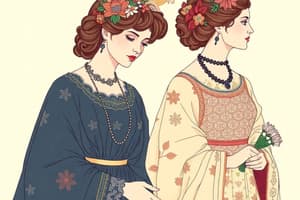Podcast
Questions and Answers
What significant legal recognition was granted to women on October 18, 1929?
What significant legal recognition was granted to women on October 18, 1929?
- Women were permitted to join the military
- Women were allowed to vote in Canada
- Women could own property
- Women became eligible to be summoned to the senate (correct)
Women were excluded from all public offices before the British Privy Council's ruling.
Women were excluded from all public offices before the British Privy Council's ruling.
True (A)
Name one of the Famous Five activists who advocated for women's rights.
Name one of the Famous Five activists who advocated for women's rights.
Irene Parlby
During World War II, women made up ____ of the workforce in the aircraft industry in Canada.
During World War II, women made up ____ of the workforce in the aircraft industry in Canada.
Who was one of the leaders in the women's suffrage movement in Manitoba?
Who was one of the leaders in the women's suffrage movement in Manitoba?
Manitoba was the last province in Canada to allow women to vote in provincial elections.
Manitoba was the last province in Canada to allow women to vote in provincial elections.
In what year did Manitoba grant women the right to vote in provincial elections?
In what year did Manitoba grant women the right to vote in provincial elections?
The phrase 'Women are persons in matters of pain and penalties, but are not persons in matters of _______' was declared by the British government.
The phrase 'Women are persons in matters of pain and penalties, but are not persons in matters of _______' was declared by the British government.
Match the following notable figures with their contributions in the women's suffrage movement:
Match the following notable figures with their contributions in the women's suffrage movement:
What was one tactic used by suffragists to achieve their goals?
What was one tactic used by suffragists to achieve their goals?
The Military Act of 1917 allowed all women in Canada to vote.
The Military Act of 1917 allowed all women in Canada to vote.
Which act declared that full rights and freedoms were granted to all persons in Canada in 1867?
Which act declared that full rights and freedoms were granted to all persons in Canada in 1867?
Flashcards
Women's Suffrage in Canada
Women's Suffrage in Canada
In 1929, the British Privy Council ruled that women are persons and have the right to be members of the Canadian Senate.
Women's Role in World War I
Women's Role in World War I
During World War I, women took on crucial roles in factories, offices, and hospitals, often working in challenging conditions.
Women's Role in World War II
Women's Role in World War II
Millions of women joined the workforce during World War II, contributing to the war effort by building ships, tanks, and bombs.
Women's Role on the Home Front
Women's Role on the Home Front
Signup and view all the flashcards
Women in Military During World War II
Women in Military During World War II
Signup and view all the flashcards
Women's Suffrage
Women's Suffrage
Signup and view all the flashcards
The Famous Five
The Famous Five
Signup and view all the flashcards
Manitoba
Manitoba
Signup and view all the flashcards
The Military Act of 1917
The Military Act of 1917
Signup and view all the flashcards
British North America Act (1867)
British North America Act (1867)
Signup and view all the flashcards
Persons Case (1929)
Persons Case (1929)
Signup and view all the flashcards
Alberta
Alberta
Signup and view all the flashcards
Robert Borden
Robert Borden
Signup and view all the flashcards
Study Notes
Women's Suffrage Movement
- Women's suffrage debate spanned decades before WWI
- Manitoba, 1916: First province to allow women to vote in provincial elections
- Nellie McClung: Key leader in Manitoba's suffrage movement
- Diverse tactics: writing/lecturing, marching/lobbying, civil disobedience (picketing, hunger strikes)
Key Moments in Canadian Women's Suffrage
- Strong Manitoba movement: Early women's rights organizations
- 1917 Military Voters Act: Limited suffrage for some white British women (war widows, sons/husbands serving overseas)
- Robert Borden's promise of equal suffrage for women
- 1918: Federal suffrage extended to women (except Quebec)
- Quebec's delayed enfranchisement: Until 1940
- 1867 BNA Act: Implied ambiguity on "persons" status of women in rights and privileges
- 1916 Emily Murphy: First woman police magistrate in Alberta, paving the way for challenging perceptions
The Famous Five and Legal Battles
- Emily Murphy, Irene Parlby, Henrietta Muir Edwards, Louise McKinney and others form the "Famous Five"
- 1917 Alberta supreme court decision: recognizing women as "persons."
- 1917 Emily Murphy attempts Senate candidacy
- 1927: Famous Five petition to the Canadian Supreme Court to define "persons," failed at first.
- 1929: British Privy Council ruling (Final ruling): Women are "persons," eligible for all public offices, including the Senate.
Women's Role during WWI and WWII
- World War I: Important contributions in munitions factories; led to first minimum wage for women.
- World War II: Massive influx into workforce (30% in Canadian aircraft industry), working in factories, offices, schools, and hospitals
- Homefront: Farms, Red Cross, military canteens, salvage drives.
- Military role: Home defense (rifle shooting/military drills); nurses in military.
Studying That Suits You
Use AI to generate personalized quizzes and flashcards to suit your learning preferences.




